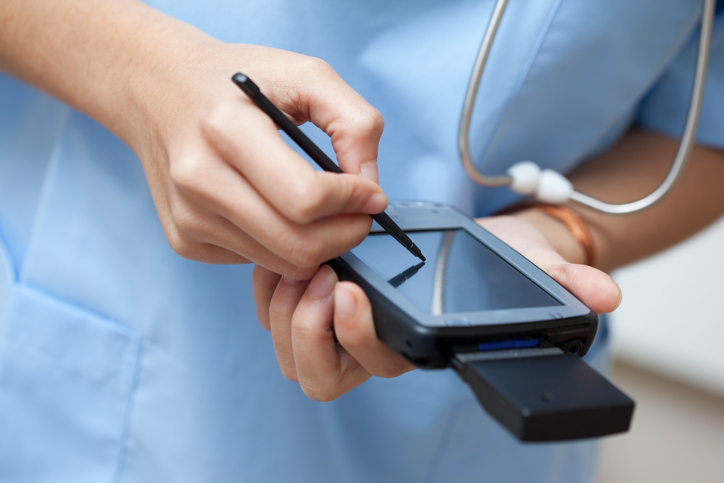Radio-frequency identification (RFID) is a technology with a big future. In essence, it’s a simple technology that uses electromagnetic fields to track tags attached to objects. However, it’s the information stored in those tags and the applications it can be used for that are transforming everything from health care to retail. To illustrate this, we’ll look at six ways RFID is reshaping the future.
- Smart RFID fitting rooms for clothing stores
RFID is set to revolutionise the way we try clothes on in fitting rooms. The new technology equips the cubicles with interactive RFID kiosks that scan the clothing and give the shopper access to helpful information. They can find out more about the item they are trying, check to see if different sizes or colours are in stock, find similar items or search for matching accessories.
The outcomes for retailers who are already using this technology have been very positive. Helping customers find the right outfit has led to increased sales and improved customer satisfaction. At the same time, the system’s ability to receive customer feedback has been instrumental in allowing stores to understand more about what their customers want to wear.
- Theme park smart card passes
Disney World, Florida, has been reaping the benefits of RFID by replacing paper tickets with RFID plastic smart cards. As visitors no longer need their tickets to be swiped by an assistant when lining up for a ride, they have shortened queueing times, the one thing everyone hates about theme parks, and reduced the number of staff required.
In addition to happier customers, Disney has also benefitted from the valuable data that the ticket chips provide. They now have a much clearer understanding of how different visitors move around the theme park, which attractions they go to, where they eat and drink, and how long they stay. This has helped them to better manage the park and its attractions so that it offers an even more enjoyable customer experience.
What’s particularly exciting about smart card RFID technology is that it is readily available to all businesses. Manufacturers, like Universal Smart Cards, not only supply smart cards but also smart wristbands and keyrings.
- RFID drones in warehouses
A range of companies now employ RFID reading drones in their warehouse to undertake the stock taking work once done by staff. The drones, which can be programmed to access all parts of the warehouse, have many advantages over their human counterparts. They are quicker at moving around, can take data readings instantaneously and are not at risk from falling off ladders.
To increase the safety of humans working beneath them, scientists at MIT have now developed a solution called Rfly which enables much smaller and safer drones, made of plastic, to be used. Instead of having a scanner attached to them, Rfly drones are fitted with a small relay that sends signals between a remote RFID labels and the readers.
- Intelligent casino chips
RFID embedded chips are now being used by many casinos. One of their main advantages is to prevent theft. When an armed gunman recently stole $1,5 million worth of chips from the Bellagio in Las Vegas, he didn’t realise that each chip was individually tagged. Should he ever try to cash them in, they’ll be scanned first and he’ll be put behind bars. The use of tagged chips means all the Bellagio actually lost were a few pieces of plastic.
However, RFID chips do more than prevent theft. They let the casino know how much gamblers spend and what they gamble on. This provides information to help the casino keep them gambling for longer; for example, they might provide the customer with free drinks just when it looks like they’re about to walk away from the table.
- Never lose another golf ball
Losing a golf ball in the rough is par for the course, most amateur golfers lose around four balls each round. However, RFID technology might be about to make that a thing of the past. Dutch company, Prazza, has now created a ball that can be scanned and found within a range of 100 yards. It means there’ll be much less time wasted on the fairway and a little extra cash spare to get a round in on the 19th hole.
If that wasn’t impressive enough, golfing giant, Calloway, is now developing RFID smart balls that can give players vital information about their playing style. A chip in the club activates the ball on contact and readers embedded in the course collect data about where it lands. This provides information about the golfer’s swing technique, aim accuracy, and distance. The hope is that these balls can give more accurate information to improve technique and assist with club customisation.
- Hospital hygiene monitoring
Hand hygiene is essential in hospitals to prevent the spread of infections such as MRSA. Using RFID, it is now possible to provide all hospital staff with tagged wristbands that can monitor the frequency of their hand washing regime. By putting a reader next to a tap or an antibacterial gel dispenser, it can log where and when they wash their hands.
Conclusion
RFID technology is making its mark in all sectors, in this post alone we’ve seen examples from retail, sports, entertainment and healthcare. Whilst the technology is quite simple, what is impressive is the innovative ways that people are finding to use it and the other technologies to which it can be applied. One only has to wonder what great things are to come in the future and how people and industry can benefit from them.
